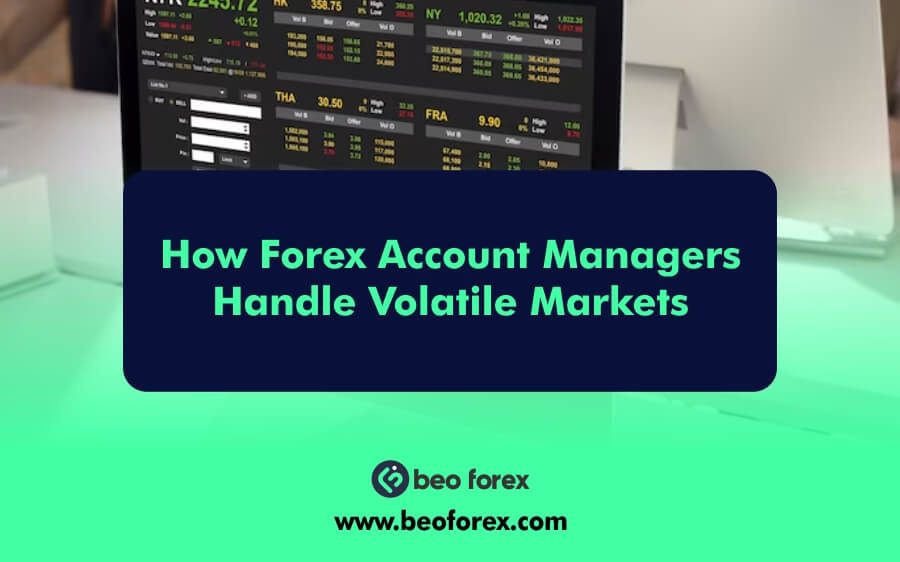Forex account managers in volatile markets have to do with how much and how quickly prices move over a given span of time. The Forex market is infamous for its volatile markets. Currency prices can fluctuate significantly in a little amount of time due to a number of variables, such as the publication of economic data, events in the geopolitical arena, and market sentiment. An issue that comes up for investors who rely on managed forex accounts is: Forex account managers in volatile markets. This article examines the methods, resources, and attitudes used by experienced forex account managers to successfully navigate volatile markets and Forex account managers in volatile markets.
Understanding Volatile Markets
Volatility in the forex market can be triggered by several factors:
- Economic Indicators: Reports on GDP growth, employment trends, and inflation rates can cause large swings in exchange prices. For example, a currency may appreciate if economic data is greater than anticipated.
- Geopolitical Events: Trade negotiations, elections, political unrest, and foreign conflicts can all lead to uncertainty, which forces traders to quickly modify their positions.
- Market Sentiment: The psychology of traders has a significant impact on market movements. Rumors, news reports, and analyst projections have the potential to affect mood and, in turn, price changes.
- Central Bank Decisions: A central bank’s choice of monetary policy or interest rate can have a direct and significant effect on the value of a currency.
Measuring Volatility
- Statistical indicators like the Average True Range (ATR) and Bollinger Bands are commonly used to quantify volatility. Account managers can evaluate market conditions and make well-informed trading decisions with the aid of these tools.
Strategies Employed by Forex Account Managers
The following are the various strategies employed by forex account managers:
1. Risk Management
The key to navigating volatile markets is effective risk management strategies. Forex account managers use a variety of tactics to safeguard investors’ money while looking for lucrative possibilities.
- Position Sizing: Taking into account the volatile market and their own risk tolerance, managers decide how big to take each trade. In extremely volatile markets, smaller position sizes are frequently employed to reduce possible losses.
- Stop-Loss Orders: It’s customary to set stop-loss orders. In order to limit excessive losses, these orders immediately close a trade at a preset price. Stop-loss orders can reduce risk in erratic markets, but they can also lapse.
- Diversification: Managers can lower the portfolio’s overall risk by spreading their investments among several currency pairs. For example, if there is a lot of volatility in one currency pair, other pairs might yield more consistent results.
2. Modifying Trading Approaches
Forex account managers frequently use a range of trading techniques in order to adjust to shifting market circumstances.
- Scalping: Some managers may employ scalping strategies during times of extreme volatile markets, placing numerous transactions for meagre returns. The success of this method depends on your ability to profit from sudden changes in pricing.
- Swing Trading: This strategy aims to profit from shorter-term price fluctuations that occur inside longer-term trends. Swing traders use technical analysis to manage risks and take advantage of price swings in erratic markets.
- Algorithmic Trading: To respond quickly to changes in the market, a lot of account managers employ algorithmic trading systems. These systems can evaluate large volumes of data and make transactions at high rates, seizing on possibilities that human traders may overlook.
3. Analysis of Technical Data
Forex account managers rely heavily on technical analysis to manage volatile markets. By evaluating historical price movements and chart patterns, managers can make informed predictions regarding future pricing behavior.
- Trend analysis: Recognizing patterns aids managers in understanding the general trajectory of the market. Knowing if a currency pair is moving higher or lower during volatile times might help you make trading decisions.
- Support and Resistance Levels: To identify entrance and exit points, managers frequently utilize support and resistance levels. In times of volatility, these levels can provide information about potential reversal or consolidation points for prices.
- Indicators and oscillators: Managers can assess market momentum and possible reversal points with the use of instruments like the Fibonacci retracement levels, Moving Average Convergence Divergence (MACD), and Relative Strength Index (RSI).
4. Analysis of Fundamentals
Fundamental analysis takes into account news releases, economic statistics, and geopolitical events, whereas technical analysis concentrates on price movements. Forex account managers keep a careful eye on these variables in order to predict future changes in the market.
- Economic Calendars: Managers can be ready for significant data releases that may cause volatile markets by keeping a watch on economic calendars. They are able to strategically place trades ahead of significant announcements thanks to their proactive technique.
- Managers evaluate the sentiment of the market by examining news stories, reports, and social media patterns. Gaining insight into the psychological impact of news on traders might help predict possible market reactions.
5. Self-Control in Emotions
Strong emotions brought on by volatility may cause traders to act impulsively. Forex account managers control their emotions to make logical decisions even in volatile market situations.
- Sticking to the Plan: Managers construct thorough trading plans that describe entry and exit strategies, risk management methods, and performance measures. Following these plans enables them to prevent having emotional reactions to changes in the market.
- Constant Learning: The forex market is always changing. Successful account managers commit to continual education and training, maintaining updated on market trends, economic movements, and new trading tactics.
The Role of Communication
1. Open Reporting
Building and sustaining trust between investors and account managers requires effective communication. An informed and involved investor base can be attained through regular reporting on account performance, methods used, and market forecast.
- Monthly Reports: A lot of account managers send out monthly reports that include risk measurements, trading methods, and profit and loss statements that summarize the success of the accounts.
- Market updates: Giving investors information on the state of the market and what’s expected might help them understand why traders make the decisions they do, particularly when volatility is high.
2. Instruction for Clients
A greater knowledge of the risks involved can be fostered by educating clients on the nature of forex trading and the movements of the market. Account managers often hold seminars, webinars, or private consultations to discuss client issues and broaden their expertise.
The Importance of Flexibility
Adaptability is critical in markets that are prone to volatility. Forex account managers need to be adaptable in their tactics and methods, prepared to change course when the market demands it.
- Adapting Strategies: Depending on the state of the market, managers may need to make adjustments to their trading plans. What works well in stable markets may not be successful in extremely volatile markets.
- Making decisions quickly is crucial in responsive decision-making. Account managers need to be aware of current events and ready to take quick action when they happen, whether it’s a surprise economic report or a change in the geopolitical landscape.
Summary
Trading in unpredictable markets is a difficult task for forex account managers. These experts work to safeguard investors’ money while taking advantage of market chances by utilizing a variety of risk management measures, customizing trading methods, utilizing technical and fundamental analysis, and preserving emotional control.
Although there are always risks associated with the forex market, managed forex accounts can provide investors with an avenue to play in this ever-changing financial landscape. Knowing how account managers function in volatile markets can help people who trust them with their money make better investment choices and feel more confident that their accounts are being managed.
Frequently Asked Questions
1. How do forex account managers evaluate volatile markets?
- To assess volatility, managers often utilize statistical metrics like the Average True Range (ATR) and Bollinger Bands. To determine possible effects on currency prices, they examine economic data, market news, and geopolitical developments.
2. What techniques do account managers employ for risk management?
- Position size, stop-loss orders, diversifying assets across currency pairings, and routinely analyzing portfolio performance to modify risk exposure are examples of common risk management techniques.
3. How do account managers modify their trading plans amid erratic market conditions?
- Depending on the state of the market, account managers may alternate between swing, algorithmic, and scalping trading techniques. They concentrate on methods that can control risk and profit from sudden changes in pricing.
4. How might technical analysis help manage volatility?
- Managers can find price trends, levels of support and resistance, and momentum indicators with the aid of technical analysis. They can use these insights to make well-informed trading decisions when volatility is high.
5. In erratic markets, how significant is fundamental analysis?
- Fundamental analysis is vital since it offers context for price changes. To predict how these factors may affect currency values, managers keep an eye on geopolitical happenings, central bank pronouncements, and releases of economic data.
6. How can account managers control their emotions?
- To prevent emotional reactions during market fluctuations, account managers adhere to pre-established trading plans, stay up to date on market trends, and make decisions systematically.
























